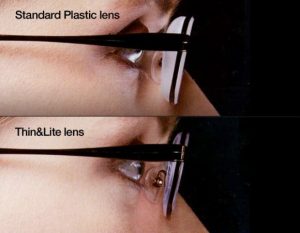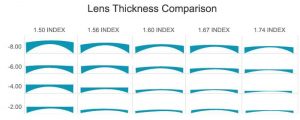For the avid glasses wearer, you’d know that lenses come in all different varieties of uses, colours, coatings, and materials. But did you know that the weight of your glasses not only get affected by the frame you choose, but also your prescription? Generally, the higher your prescription, the thicker the lens.
The size and shape of your frames will also affect the thickness of your lenses, especially if your prescription is high. This is because there is physically more lens in the frames, and for myopic or near-sighted people, lenses become increasingly thicker towards the edge of the lens. Therefore choosing a smaller, well-centred frame can greatly reduce the thickness and weight of the lenses. In saying this, for those wanting to keep on-trend with large frames, you also have the option of choosing high index lenses.
High index lens materials bend light more efficiently to make your lenses noticeably thinner, lighter and more attractive. As a general rule, the higher the index, the thinner the lens, with the thinnest lens (1.74) being at least 50% thinner than conventional lenses (1.5).
| Refractive index | Details | Abbe value |
| 1.5 | Conventional lens | 58 |
| 1.53 | Extra tough to prevent chipping or cracking. Great for rimless or half-rim frames. | 43 |
| 1.56 | Mid-index. Low cost. | 37 |
| 1.59 | Polycarbonate lenses are impact-resistant and made for safety glasses. Due to the low Abbe value, we do not recommend this lens for general use. | 30 |
| 1.6 | Mid-index | 41 |
| 1.67 | High-index | 32 |
| 1.74 | The thinnest plastic lens on the market. Blocks 100% of UV. Lightweight | 33 |
Abbe value: A measure of the tendency for a material to cause chromatic aberrations (coloured halos or fringes around lights, especially when looking through the periphery of the lens). The higher the Abbe value, the less likely the chromatic aberration will be noticeable.
Nevertheless, there are certain trade off’s that come with choosing high index lenses. Although all lenses reflect some light off the surface, high index lenses can reflect up to 50% more light than conventional lenses, causing distortions and reducing clarity of vision. This is why it’s a good idea to add anti-reflection coating to the lenses, which allows 99.5% of light to pass through the lens, virtually eliminating unwanted reflections. Studies have also shown that lenses with anti-reflection coating provides sharper night vision with less glare.
There are lots of factors to consider when choosing the best lenses for your glasses, which is why we are here to help! So next time you’re choosing a new pair of glasses, please don’t hesitate to seek our expert opinion.


